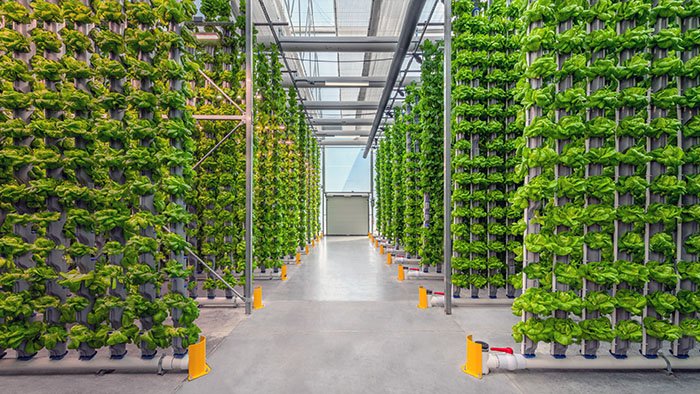What Is Organic Produce?
Organic produce has become a staple in many households. Consumers are increasingly drawn to fruits and vegetables grown under this certification, which reflects a growing awareness of health and environmental concerns.
However, as we shop for healthy produce, we must ask ourselves what "organic" means. We should also consider whether organic fruits and vegetables are the best option. It's crucial to understand the benefits and limitations of organic farming practices. We should also consider innovative alternatives. Other options may be better suited for sustainable, year-round food production.
Defining Organic Produce
Organic produce has gained significant traction in recent years. But what exactly does "organic" mean regarding fruits and vegetables? Let's break down the key aspects that define organic produce.
What Makes Produce Organic?
Organic produce refers to fruits and vegetables grown following specific guidelines, which are set by regulatory bodies like the USDA. The organic label prohibits synthetic fertilizers, pesticides, and GMOs.
To be certified organic, farmers must use natural fertilizers like compost. They must practice crop rotation to maintain soil health. They also employ natural pest control methods, like beneficial insects or pest traps.
Organic Fruits and Vegetables
Common organic fruits include apples, strawberries, and grapes. Popular organic vegetables may be leafy greens, peppers, and carrots. These items are grown without synthetic chemicals. This process aims to preserve natural ecosystems and potentially offer higher nutrient content.
However, it's important to note that "organic" doesn't necessarily mean "pesticide-free." Organic farmers can use certain approved natural pesticides, but these chemicals may still have environmental impacts.
The Role of Organic Agriculture in Today's Economy
The organic food industry has experienced significant growth in recent years. This expansion impacts various aspects of the agricultural sector and the broader economy. Let's examine the economic implications of this trend.
Organic Agriculture Jobs and Economic Impact
Organic farming has created new job opportunities, from farm laborers to organic certification specialists. The industry's growth has also spurred innovations, including advances in natural pest control and soil management techniques.
Economically, organic produce often commands premium prices, potentially increasing farmers' profit margins. However, higher costs are associated with organic farming practices. These expenses present challenges, especially for smaller operations transitioning from conventional methods.
Despite these challenges, the expanding organic market shapes agricultural practices and consumer behavior. It influences everything from local farmers' markets to large-scale retail operations.
Limitations of Organic Farming
While organic farming offers many benefits, it's important to recognize its limitations. Understanding these challenges helps us appreciate alternative methods, like hydroponics. We can also see why they are gaining traction.
Land and Resource Requirements
Organic farming requires more land to produce the same yield as conventional farming. This increased land use can potentially lead to deforestation if not managed carefully. Additionally, organic farms often need more water due to less efficient irrigation systems.
Seasonal Constraints
Organic produce is subject to seasonal variations and local climate conditions. This can result in inconsistent availability and quality throughout the year. The impact is especially pronounced in regions with extreme weather patterns.
Yield Challenges
Without synthetic fertilizers and pesticides, organic farms may experience lower yields. They are particularly vulnerable to pest outbreaks or certain adverse weather conditions. This can lead to higher prices for consumers and potential supply shortages.
Hydroponics: A Sustainable Alternative
As we consider the limitations of traditional organic farming, we should explore alternatives. Innovations aim to solve these issues while prioritizing sustainability and health. Hydroponics offers a compelling solution that combines healthy, sustainable farming with cutting-edge technology.
What is Hydroponic Farming?
Hydroponic farming is a method of growing plants without soil. Instead, hydroponic growers use nutrient-rich water solutions to feed plants. This technique allows for precise control over plant nutrition and growing conditions. Eden Green has advanced hydroponic systems that take this concept to the next level. They offer a sustainable and efficient way to produce fresh, healthy produce.
Benefits of Hydroponic Produce
Hydroponic farming offers several advantages over traditional organic methods:
Year-round production: Climate-controlled environments allow farmers to grow year-round. They maintain consistent growing conditions regardless of season or weather.
Water efficiency: Water is at a premium in many regions. Hydroponic systems use up to 95% less water than traditional farming methods.
Reduced land use: Vertical farming techniques enable high yields in small spaces. They minimize deforestation and land degradation.
Pesticide-free growing: Controlled environments reduce the need for pesticides, even natural ones.
To learn more about how these systems work, visit our How it Works page. There, you'll find a detailed explanation of the hydroponic growing process.
Eden Green's Hydroponic Technology
Eden Green's innovative approach combines vertical greenhouse systems with advanced hydroponics. This technology enables local production capabilities. It ensures fresh produce is available to nearby communities year-round. The controlled environment results in consistent quality and yield. It addresses many of the challenges faced by traditional organic farming.
Eden Green's mission is to provide accessible, affordable, and safe food for all. Our sustainable, efficient method aligns with why many buy organic fruits and vegetables.
Comparing Organic and Hydroponic Produce
Today's consumers are more conscious about their food choices. They want to make informed decisions about the products they purchase and consume. It's important to understand how hydroponic produce compares to organic options. Let's explore the key differences in nutritional value, environmental impact, and availability.
Nutritional Value
Both organic and hydroponic produce can be highly nutritious. Organic fruits and vegetables are often praised for being more healthy. This is largely due to their potential to have higher levels of certain antioxidants. However, hydroponic produce can also optimize nutrient content. Hydroponic growers can boost nutritional value through precise control over their crops. They can carefully manage growing conditions and nutrient solutions for optimal nutrient content.
Environmental Impact
Organic farming aims to minimize environmental impact, but it still requires significant land and water resources. Hydroponic systems, on the other hand, offer solutions for these requirements. They use up to 95% less water and can be vertically stacked, dramatically reducing land use. They can even thrive in urban areas! This efficiency makes hydroponics a compelling option for sustainable agriculture.
Availability and Consistency
Organic produce is subject to seasonal variations and regional climate conditions. These factors are beyond our control and can affect both availability and quality. Hydroponic systems, conversely, offer year-round production in controlled environments. This results in consistent quality and availability, regardless of external weather conditions.
By considering these factors, consumers can make informed choices about their produce. They can balance nutritional needs, environmental concerns, and personal preferences.
FAQs
What is considered organic produce?
Organic produce is grown without synthetic pesticides, fertilizers, or GMOs. It must meet strict USDA certification standards. These standards include using natural fertilizers, soil health measures, and pest control.
Are there still pesticides on organic produce?
While organic farming prohibits synthetic pesticides, it may use approved natural pesticides. These can still leave residues, so you should always wash fresh produce.
Are hydroponics and organic produce the same thing?
No, they're different. Organic produce is soil-grown, following specific guidelines. Hydroponic produce is grown without soil in nutrient-rich water solutions. Hydroponics offers many benefits of organic farming, such as avoiding synthetic pesticides. However, its features added advantages in efficiency and consistency.
Is hydroponic agriculture sustainable?
Yes, hydroponic agriculture is highly sustainable when properly managed. It uses significantly less water and land than traditional farming methods. It also allows for year-round production and can be implemented in urban environments. These factors reduce transportation needs and carbon footprints.
Embracing Innovative and Sustainable Produce Solutions
Above, we've explored the world of organic produce and its alternatives. Hydroponics offers a compelling solution for sustainable, year-round food production. While organic farming has its merits, hydroponic systems address many of its limitations. They provide consistent, high-quality produce with a smaller environmental footprint.
Are you a produce buyer interested in partnering with a sustainable hydroponic solution for your store or restaurant? We invite you to contact us today.









